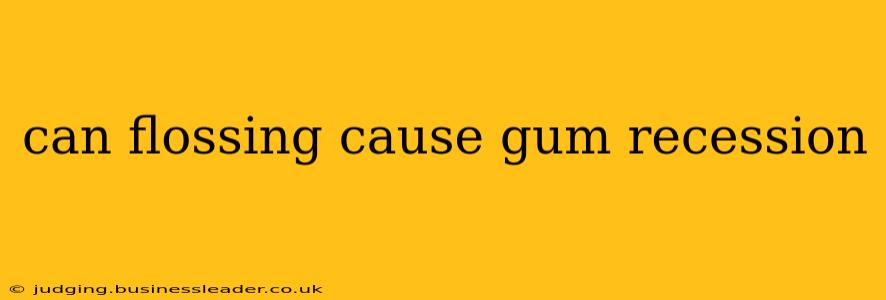Gum recession, the gradual wearing away of gum tissue, exposing more of the tooth root, is a common dental concern. While it's often associated with gum disease, a question many people have is whether flossing itself can contribute to this problem. The short answer is: improper flossing technique can contribute to gum recession, but proper flossing is essential for gum health.
This article will delve into the relationship between flossing and gum recession, exploring the causes, prevention, and how to floss correctly to protect your gums.
How Can Flossing Contribute to Gum Recession?
The primary way flossing can contribute to gum recession is through aggressive or improper technique. Using excessive force, sawing the floss back and forth against the gums, or snapping the floss between the teeth can injure the delicate gum tissue. This injury can lead to inflammation, and over time, recession. Think of it like constantly rubbing your skin – it will eventually become irritated and damaged. Similarly, harsh flossing can damage the gum line.
What are other causes of gum recession?
While improper flossing can contribute, it's crucial to understand that it's rarely the sole culprit. Many other factors can cause gum recession, including:
- Aggressive brushing: Brushing too hard with a hard-bristled toothbrush can abrade the gums and lead to recession.
- Gum disease (periodontitis): This is the most common cause of gum recession. Bacteria build up, leading to inflammation and infection that destroys the supporting tissues around the teeth.
- Genetics: Some individuals are genetically predisposed to gum recession, regardless of their oral hygiene habits.
- Hormonal changes: Fluctuations in hormone levels, particularly during pregnancy or menopause, can affect gum health and increase the risk of recession.
- Grinding or clenching teeth (bruxism): This puts excessive pressure on the teeth and gums, potentially leading to recession.
- Misaligned teeth: Crooked or crowded teeth can make it harder to clean effectively, increasing the risk of gum disease and recession.
- Smoking: Smoking weakens the immune system, making individuals more susceptible to gum disease and recession.
- Certain medications: Some medications, such as those used to treat certain medical conditions, can have side effects that affect gum health.
Is it possible to floss too much?
While regular flossing is crucial, it's indeed possible to overdo it. Flossing too aggressively or too frequently can cause damage. Aim for once a day, using gentle movements.
How to Floss Properly to Avoid Gum Recession
Proper flossing technique is paramount to preventing gum recession and maintaining optimal oral health. Here's how:
- Use the right amount of floss: Break off about 18 inches of floss and wrap most of it around your middle fingers, leaving about an inch to work with.
- Use gentle movements: Gently guide the floss between your teeth using a sawing motion, avoiding snapping the floss.
- Curve the floss around the tooth: Curve the floss into a "C" shape against the side of each tooth, gently sliding it up and down against the gum line. Avoid snapping or sawing the floss against the gums.
- Clean each surface: Make sure to clean both sides of each tooth, ensuring you get all the way to the gum line.
- Use fresh sections of floss: Use a clean section of floss for each tooth.
How can I tell if my flossing is causing gum recession?
If you notice any bleeding that persists, increased sensitivity, or any visible changes to your gum line, consult your dentist immediately. They can assess the situation and advise on the best course of action.
What should I do if I think my flossing is causing gum recession?
If you suspect your flossing technique is contributing to gum recession, consult your dentist or periodontist. They can evaluate your flossing technique, assess your gum health, and provide personalized recommendations. They might suggest adjustments to your brushing and flossing techniques, or other treatment options if necessary.
In conclusion, while proper flossing is vital for preventing gum disease and maintaining healthy gums, aggressive or improper flossing technique can indeed contribute to gum recession. By understanding the correct technique and seeking professional guidance when necessary, you can protect your gums and maintain a healthy smile. Remember, prevention is always better than cure!
